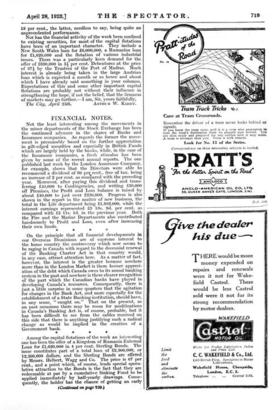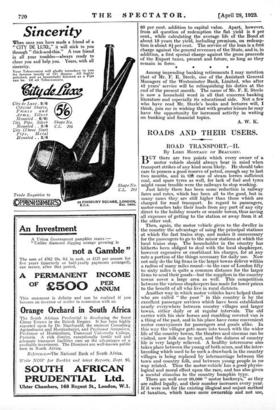FINANCIAL NOTES.
Not the least interesting among the movements in the minor departments of the Stock Exchange has been the continued advance in the shares of Banks and In.surance companies. As regards the former the move- ment is presumably based on the further appreciation in gilt-edged securities and especially in British Funds which are largely held by the banks, while, in the case of the Insurance companies, a fresh stimulus has been given by some of the recent annual reports. The one published last week by the London Assurance Company, for example, shows that the Directors were able to recommend a dividend of 80 pevent., free of tax, being an increase of 2 per cent. as compared with the preceding year. Moreover, after paying this dividend and trans- ferring £40,000 to Contingencies, and writing £50,000 off Premises, the Profit and Loss balance is raised by about £40,000 to just over £250,000. Progress is also shown in the report in the matter of new business, the total in the Life department being £1,382,000, while the interest earnings represented £5 13s. 9d. per cent. as compared with £5 1 ls. ld. in the previous year. Both the Fire and the Marine Departments also contributed handsomely to Profit and Loss, even after increasing their own funds.
On the principle that all financial developments in our Overseas Dominions are of supreme interest to the home country the controversy which now seems to be raging in Canada with regard to the decennial renewal of the Banking Charter Act in that country would, in any case, attract attention here. As a matter of fact, however, the interest is the greater because nowhere more than in the London Market is there keener appreci- ation of the debt which Canada owes to its sound banking system in the past and nowhere is there clearer recognition of the part which the Canadian banks have played in developing Canada's resources. Consequently, there is just a little surprise in some quarters that the agitation for changes in the Bank Act, and more especially for the establishment of a State Banking institution, should have, in any sense, " caught on." That on the present, as on past occasions there may be room for modifications in Canada's Banking Act is, of course, probable, but it has been difficult to see from the cables received on this side that there is anything justifying such a radical change as would be implied in the creation of a Government bank.
* * * * Among the capital flotations of the week an interesting one has been the offer of a Kingdom of Rumania External Loan for £1,620,000 in 4 per cent. Sterling Bonds. The issue constitutes part of a total loan of £2,500,000, or 12,500,000 dollars, and the Sterling Bonds are offered by Messrs. Helbert, Wagg and Co. The price is 67 per cent., and a point which, of course, lends special specu- lative attraction to the Bonds is the fact that they are redeemable at par by a cumulative Sinking Fund to be applied immediately by half-yearly drawings. Conse- quently, the holder has the chance of getting an early (Continued on page 720.) 38 per cent. addition to capital value. Apart, however, from all question of redemption the flat yield is 6 per cent., while calculating the average life of the Bond at about 13 years the yield, including premium, on redemp- tion is about 84 per cent. The service of the loan is a first charge against the general revenues of the State, and is, in addition, a first special charge against the gross proceeds of the Export taxes, present and future, so long as they remain in force. * Among impending banking retirements I may mention that of Mr. F. E. Steele, one of the Assistant General Managers of the Westminster Bank, Limited, who after 42 years' service will be relinquishing his duties at the end of the present month. The name of Mr. F. E. Steele is now a household word in all that concerns banking literature and especially its educational side. Not a few who have read Mr. Steele's books and lectures will, I think, join me in wishing that with greater leisure he may have the opportunity for increased activity in writing on banking and financial topics.
A. W. K.



















































 Previous page
Previous page